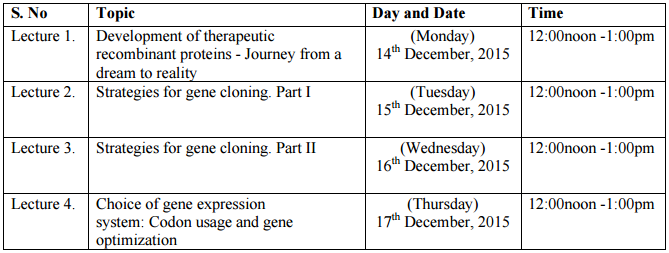Virtual Education Project of Pakistan (VEPP) is going to organize Online Lecture Series: “Recent Advances in DNA Recombinant Technology–Past, Present and Tomorrow” during December 14-17, 2015 will be delivered by Dr. Abdur Rehman Siddiqi (Clonetex Systems Inc., Austin, TX, USA).
Event Title: Online Lecture Series: Recent Advances in DNA Recombinant Technology – Past, Present and Tomorrow
Event Date: December 14-17, 2015
Event Venue: Video Conferencing room of the L.E.J. National Science Information Center, ICCBS, University of Karachi and Video Conferencing Rooms/Studios of Participating Universities.
Introduction of the Speaker
Dr. Siddiqi is associated with Clonetex Systems Inc., Austin, TX, USA as the President and CEO since 2004. Clonetex Systems is a biotech consulting company that provides molecular biology services to its client in USA and throughout the world. He has been extensively engaged in research and development aspects of various research projects that involve molecular cloning, development of gene expression systems, gene synthesis, recombinant protein expression and purification. He is an alumnus of ICCBS.
Schedule of Lecture Series

Abstracts of the Lecture Series
First Lecture: Development of therapeutic recombinant proteins – Journey from a dream to reality
During the last two decades there have been many rapid developments in recombinant technology. These developments have made a profound impact in many areas of basic and applied research in the field of agriculture, drug discovery, vaccine development, clinical diagnosis and clinical treatments. Both biotech industry and academic research group continue to develop effective methods for producing recombinant proteins to facilitate pre-clinical and clinical evaluation of potential therapeutics. Production of recombinant proteins has been optimized using living laboratories such as E.coli, plants and mammalian cells. Thus, an increasing number of successful drugs are therapeutic recombinant proteins including monoclonal antibodies. These therapeutic recombinant proteins, commonly referred to as biologics or biosimilar, are being used for the treatment of a number of diseases including cancer and autoimmune/ inflammatory diseases. Some of these biologics that are extensively used for autoimmune/ inflammatory diseases include Enbrel, Remicade, Stelara and Humira.Therapeutic monoclonal antibodies have emerged as amajor source of blockbuster drugs and their market share is projected to reach more than $160 billion in the USA alone over the next few years.This presentation will focus on the use of recombinant technology for the development of mammalian therapeutic proteins with emphasis on monoclonal antibodies.
Therapeutic monoclonal antibodies have emerged as amajor source of blockbuster drugs and their market share is projected to reach more than $160 billion in the USA alone over the next few years.This presentation will focus on the use of recombinant technology for the development of mammalian therapeutic proteins with emphasis on monoclonal antibodies.
Second and Third Lecture: Strategies for gene cloning and expression: Part I & Part II
Gene cloning is a way to create copies of a particular gene from one organism to another. Classical gene cloning involves the transfer of a gene of interest or its fragment from one organism to a self-replicating genetic element referred to as cloning vehicle or vector.
During early 1970s, with the discovery of restriction endonucleases – enzymes that selectively and specifically cut molecules of DNA – recombinant DNA technology has seen exponential growth in both application and sophistication, yielding increasingly powerful tools for DNA manipulation. Cloning genes is now so simple and efficient that it has become a standard laboratory technique. This has led to an explosion in the understanding of gene function in recent decades. Thus gene cloning has evolved from the cloning of a single DNA fragment to the assembly of multiple DNA components into a single contiguous stretch of DNA. Emerging technologies seek to transform cloning into a process that is as simple as arranging “blocks” of DNA next to each other. The advantages of such technologies are that they are standardized, seamless and mostly sequence independent.
Goal of this presentation is to introduce basic gene cloning technique and discuss various options available to choose for gene cloning and expression.
Fourth Lecture: Choice of gene expression system: Codon usage and gene optimization
Today, a variety of gene expression systems are available for expressions of recombinant proteins that are derived from prokaryotic- to eukaryotic-origin. Technologies that are developed to express recombinant proteins in organism of choice are of widespread use in industry, health care, and scientific research because of their flexibility and ability to achieve production levels exceeding those of the native source of the protein.
An expression system consists of a vector carrying the gene encoding the protein of interest, along with the sequences necessary for transcription of the DNA into messenger RNA and translation of the mRNA into protein, plus a host providing the enzymatic machinery for carrying out these processes. In a homologous expression system, the gene to be expressed derives from the same species as the host whereas, in a heterologous expression system, the gene to be expressed and the host are of different origin.
There are certain aspects of gene expression that are different in eukaryotes and prokaryotes, and these differences can be resolved. A significant development in gene synthesis technology has made it possible to synthesize gene of any origin with codon usage and gene optimization based on the intended host organism or cells for protein expression.
In this presentation, choice of various gene expression systems will be presented with an overview of codon usage and gene optimization for gene synthesis.
For Correspondence
Sheeba Naz
Manager
Virtual Education Project Pakistan (VEPP)
UAN: 111-222-292 Ext 274, 275
Email: [email protected]
